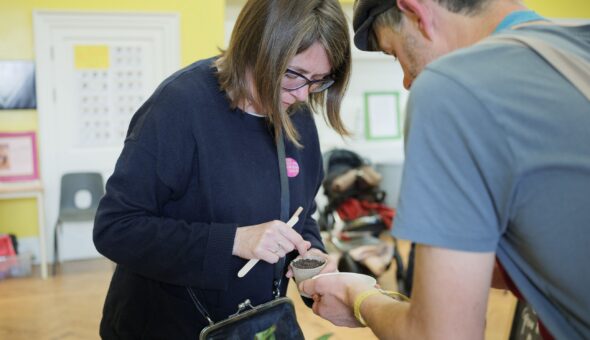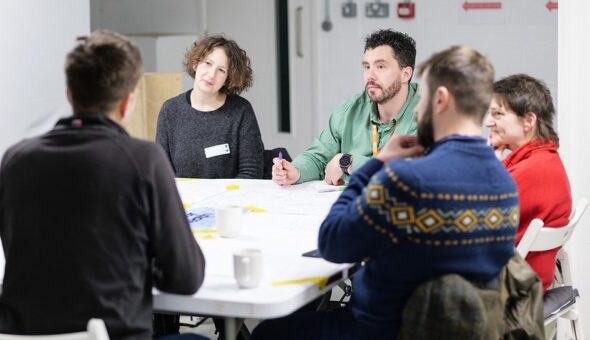Exciting new community-based research network based in Twerton and Whiteway successfully secures funding from from UK Research and Innovation (UKRI).
Research with, by and for Twerton and Whiteway
A consortium of organisations based in Twerton and Whiteway, have formed the Twerton and Whiteway Community Research Network and have successfully secured £25,000 of investment from UKRI.
Led by Bath City Farm, the Network is a collaboration between First Steps Bath, Southside Family Project, and Youth Connect South West, who are part of the wider Twerton & Whiteway Community Network, a group of sixteen local organisations in the area. Over the next six months the Network will working with local residents and other groups living in the area, and us here at the University of Bath and colleagues at Bath Spa University to identify areas of interest that they'd like to explore in more detail that will form a community-based research agenda.
The Network aims to build local knowledge, skills, and capacity to support research produced with, by, and for local communities in Twerton and Whiteway. This first phase of the Network's work will inform their application to phase two of the UKRI Community Research Network programme.
The full project will aspire to develop, train and support residents as Community Researchers. This opportunity could transform how community needs, strengths and potential are identified and understood in Twerton and Whiteway and how local residents are involved in research about them and their communities, empowering them to engage with decision-makers such as Bath and North East Somerset council and organisations such as universities.
If you want to find out more, keep up to date with the work of the Network or how you might be able to support them, sign up to Twerton and Whiteway Community Research Network Newsletter. drop us a line (public-engagement@bath.ac.uk).
Strengthen public involvement in research
We're thrilled that the Twerton and Whiteway Network have been awarded funding, building on their fantastic work supporting the community during the COVID-19 emergency.
The funding scheme is a long overdue first step in addressing the imbalance in funding for research infrastructure from universities to communities and a response to a piece of research commissioned by UKRI carried out by the Institute of Communities Studies (ICS).
The funding specifically aims to "strengthen public’s role in research and innovation" and empower communities to develop their own research agendas and build their capability and expertise in community-led forms of research.
But why now?
COVID-19. In short. During the pandemic we saw (and far more importantly funders and decision-makers saw), unsurprisingly, that community-led responses to the crisis were the most effective. When given the right support communities can and will solve the crises they face, whether that be social, economic or health and wellbeing situations. The Community Research Network funding scheme responds to this new post-pandemic landscape and what the ICS documented brilliantly in An Equitable Future for Research and Innovation.
Changing dynamics
The ICS report feels important, but is a difficult read. The research found that regardless of whether they are local government, charities, community organisations or informal community networks and groups, there is a persistent inequality in the balance of power in relationships between them and research organisations such as universities and research funders.
The inequality highlighted ranges from power over decisions, to grave issues of injustice where communities’ feel their experiences are used or ‘exploited’ in research. In almost every situation, researchers take the ‘lead’ in partnerships with non-research organisations.
The report highlights that this imbalance is a result of the short-term nature of funding and who gets that funding (more often than not research organisations).
Even in well-intended partnerships, the public/community groups who are invited to participate in research are rarely given power over what and why knowledge is needed, how knowledge that affects them is created, or what knowledge is valued. The invitation to be involved in research is then often confined to limited forms of ‘taking part’ – rather than owning the agenda or setting the terms for their involvement.
The knowledge within communities and generated by communities, is not given equal recognition or value, and doesn't receive funding, power, legitimacy or support in the way research approaches, infrastructure and activities at universities do.
The An Equitable Future for Research and Innovation is definitely worth a read, drop us a line (public-engagement@bath.ac.uk) if any of this resontates with your experience.
What's happening at the University of Bath
Some of the findings in the report echo what we found during our Community Listening exercise. The communities we spoke to, like many communities across the UK feel that research is done on them, and not with or for them. With this funding the Twerton and Whiteway Community Research Network will identify and undertake research that matters to them, in ways that ensure the benefits remain with the community.
With our ParticipatoryResearch@Bath project and our role supporting the Twerton and Whiteway Community Research Network, we're seeking to better understand how we can make changes to support colleagues to address some of the issues raised in this report and develop more equitable relationships.
If you want to get involved or have some examples from your work, we'd love to chat. Drop us a line (public-engagement@bath.ac.uk).
Dean Veall is Deputy Head of Public Engagement at the University of Bath
Respond


